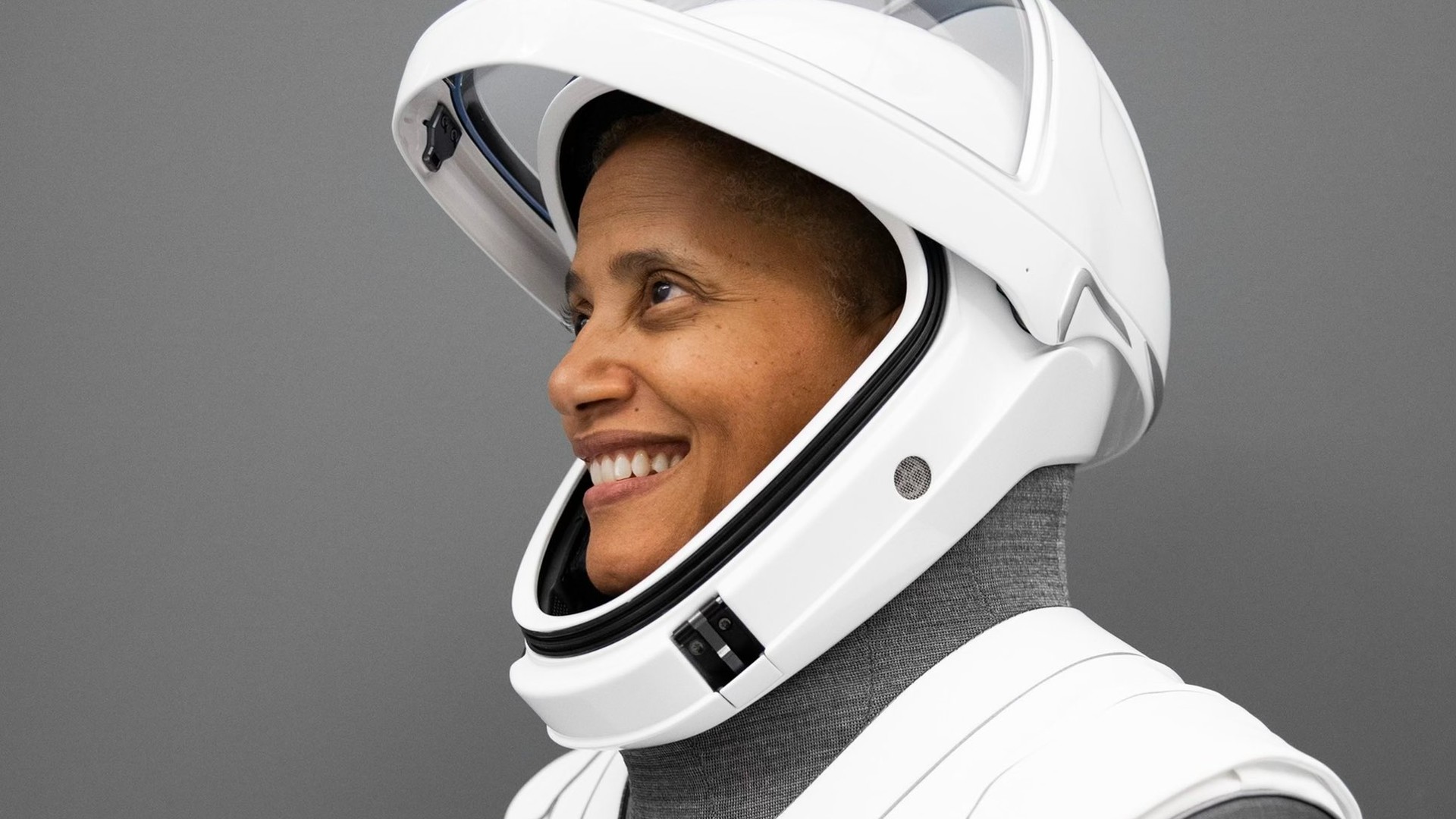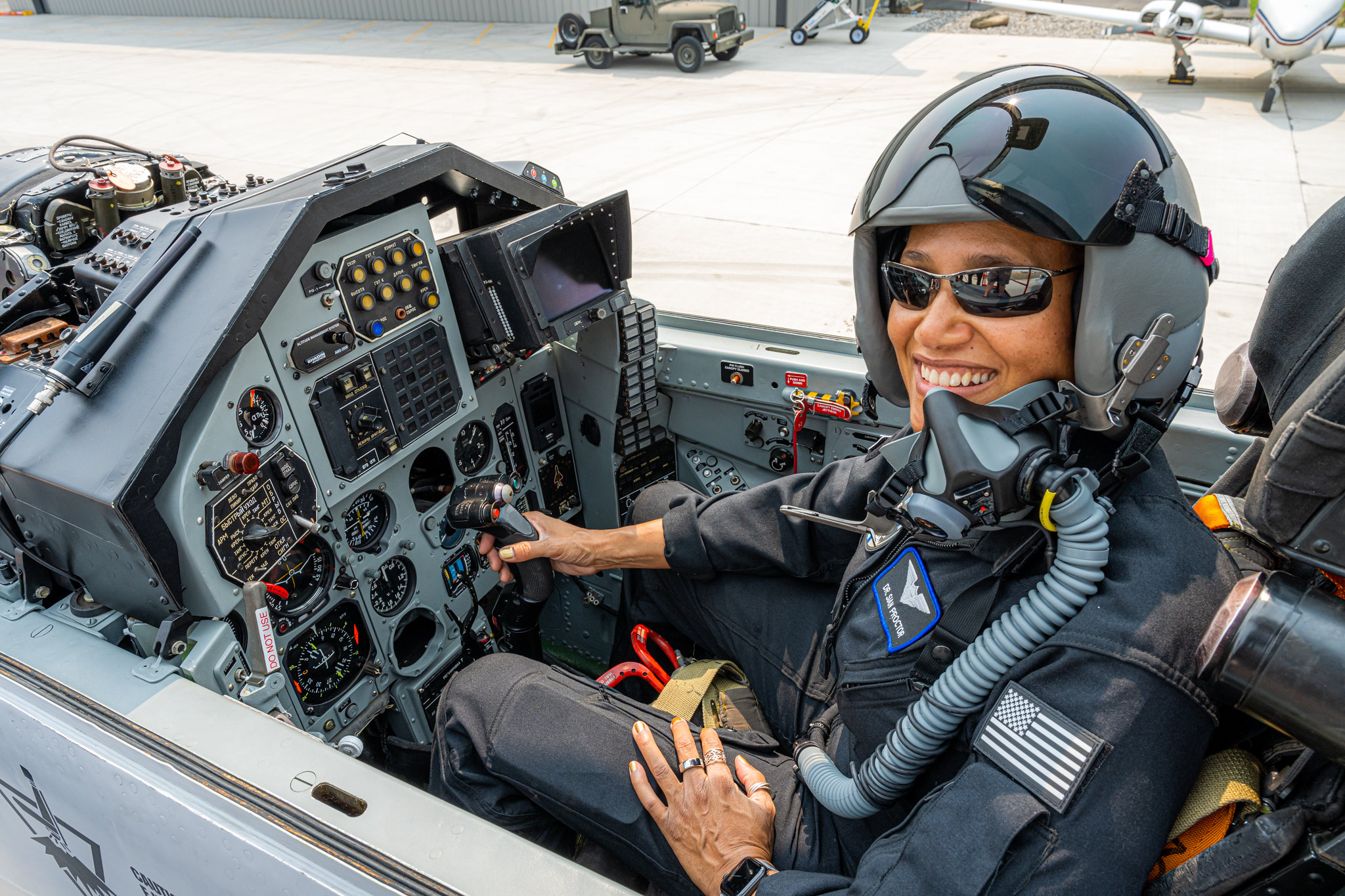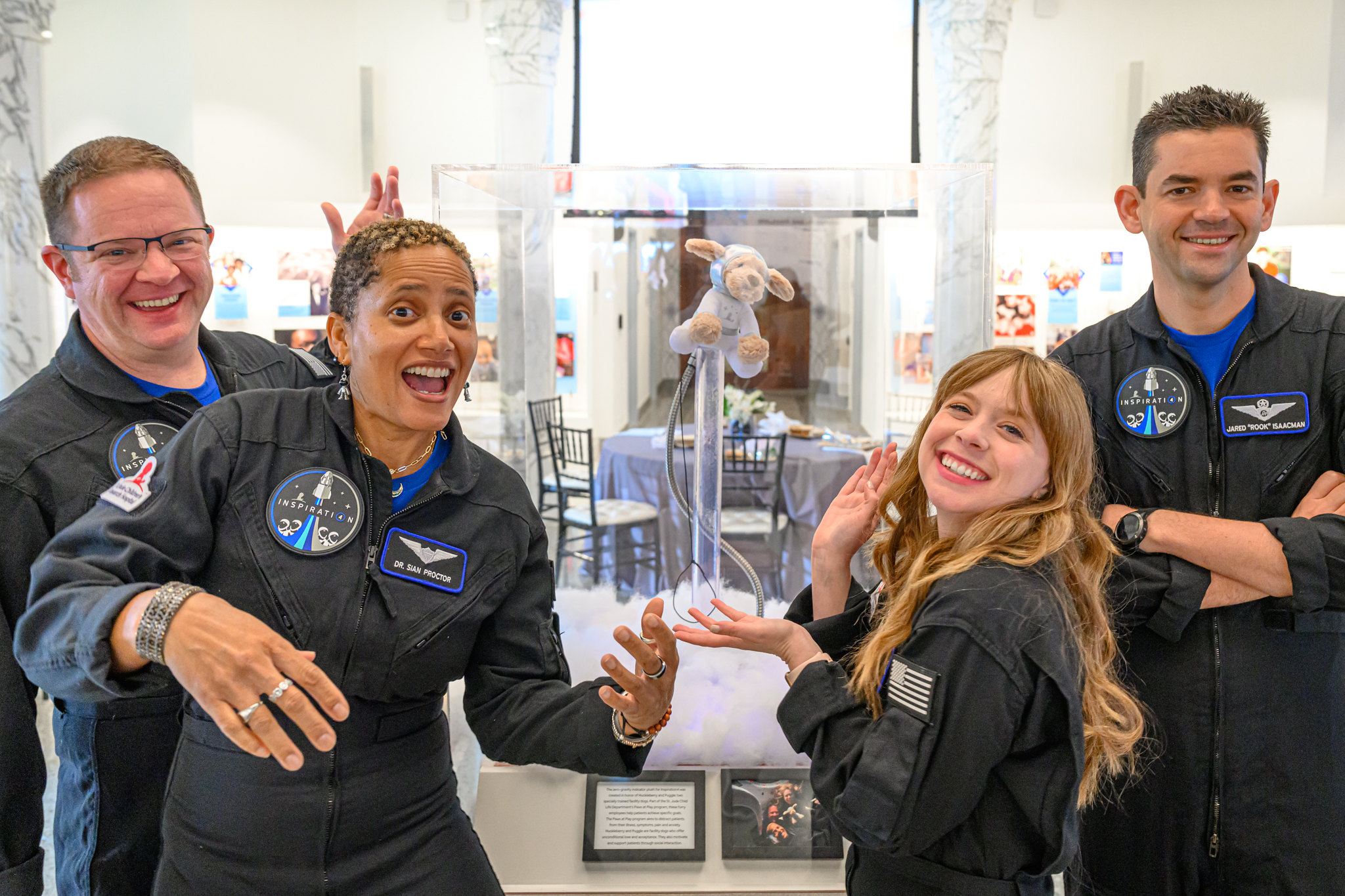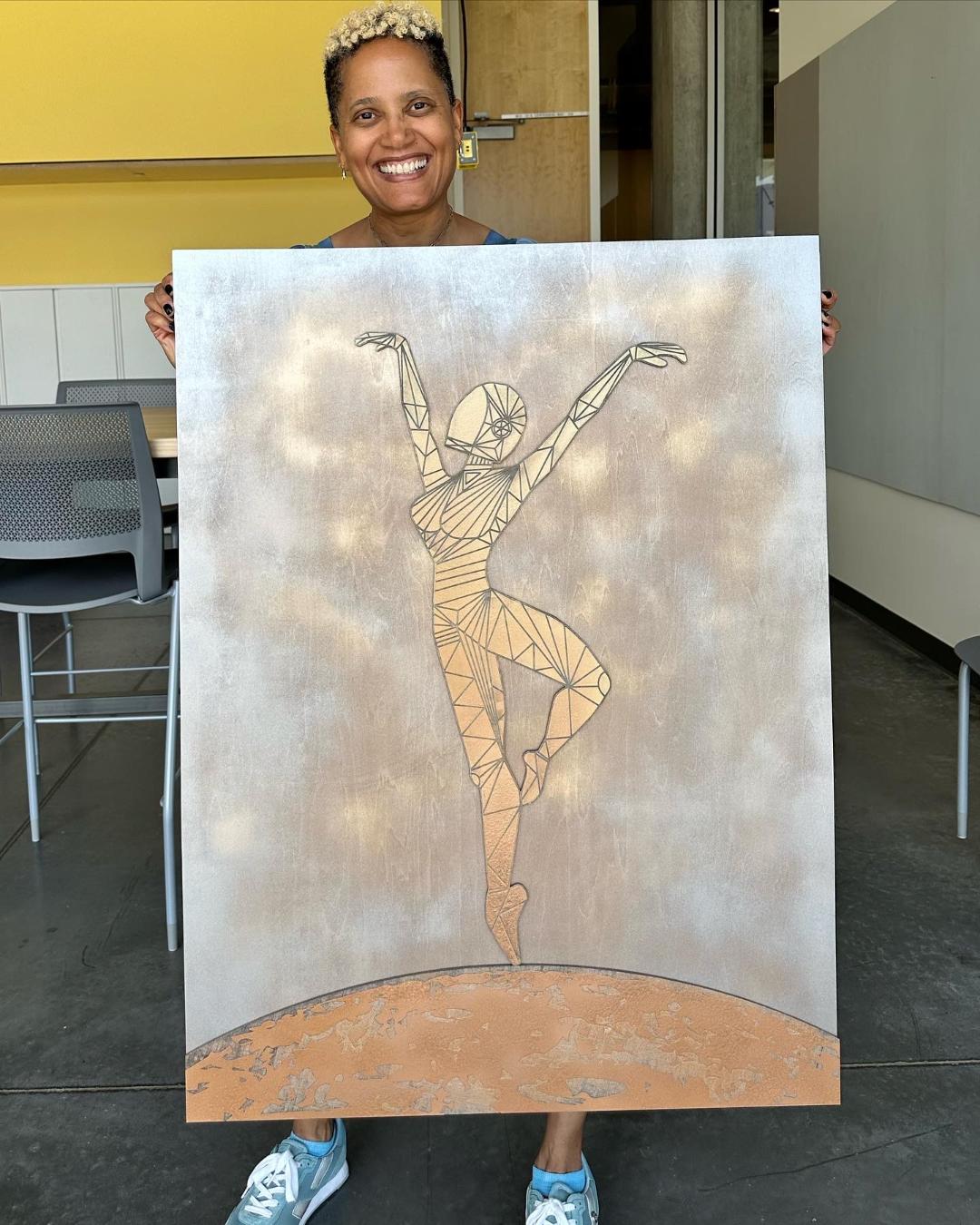
Dr. Sian Proctor is known for breaking new ground.
Proctor paved the way for women and the African-American community in 2021 as part of Inspiration4, the world's first all-civilian mission to orbit in space. At 51, Proctor also made history becoming the first Black commercial astronaut and first Black woman to pilot a spacecraft.
Long before to going to space, Proctor lived her own Hallmark movie by playing on an all-boys hockey team and, while in space, got to be on the phone with U2 singer Bono. But before she was chosen for this life-changing mission, there were many detours to navigate and challenges to overcome.
Space.com had the opportunity to spend an hour with Dr. Proctor to talk more about her inspirational journey as we celebrate Black History Month and Women's History Month.
Related: Inspiration4 astronaut Sian Proctor reflects on historic SpaceX spaceflight experience
Space.com: You are somebody that has been such a shining star, so to start off, why don't you start with the beginning story? Some people get bitten by the space bug when they're a kid and some later in life. Where did that come into play for you?
Proctor: I've been chasing space my entire life! My dad was working at the NASA tracking station on Guam during the Apollo missions and I was born 8.5 months after Neil Armstrong took those famous first steps so I was a moon celebration baby! I grew up with all of this memorabilia to my dad, including the Neil Armstrong autograph where Neil thanked my dad for all the help that he did for Apollo 11, so in my earliest memories I loved military, aviation and military jets. I think the reason why is because I was so influenced by "The Right Stuff" — they were all fighter pilots. And growing up in the 70s and 80s, "Top Gun" came out in the 80s and I just loved that movie!
Space.com: You had a very supportive family, especially with constant encouragement from your Dad, always telling you anything was possible and buying you model airplanes and books to keep your dream alive. But when you were growing up, there were several roadblocks that started to come up along the way to achieve this goal, and so you had to start an alternative career path.
I’m #almost50 & reflecting on my life. It’s a sad birthday for me because my parents are both gone & crazy times. I’ve got a box of stuff from my mom that I’m determined to go through to #celebrate my #life & their story. This is my only photo of just me & my parents!❤️ #mystory pic.twitter.com/XBLvMX95soMarch 26, 2020
Proctor: There were no women fighter pilots during that time or Black female astronauts, but my dad just encouraged me and never told me those things. And the limiting factor though back in the 80s was that you couldn't be a military aviator if you had glasses. I got glasses when I was about maybe 13-14, but I just knew that I wasn't going to be able to be a military aviator. I thought if I couldn't be a military aviator, then I couldn't be an astronaut — in my head those two things were linked.
I also wasn't the most studious person as a kid so you know being a mission specialist, I was like I'm not going to MIT, and so I went off and I became a geoscientist and an explorer. I got my undergrad in environmental science, my master's in geology and then my PhD in science education because while I was going through my master's program, I discovered the love for teaching and I knew I specifically wanted to be a community college professor here in Arizona. I was very fortunate to get hired right after I got my Master's at South Mountain Community College and this is my 25th year as part of Maricopa Community Colleges.

Space.com: As with any dream or passion, when it's big enough you still have that hope deep inside that someday you will achieve it. So while you had a career you loved, there still was that desire to "chase space" and fly so you started training for NASA's astronaut program while you were in your 30s.
Proctor: I always wanted to fly so I said I'm getting my pilot's license and got scuba certified — I was just living the life of an explorer and adventurer. In my late 30s, somebody said NASA is looking for astronauts and you should apply! I was so honored that they even thought that I fit the mold of what an astronaut is because it was that childhood dream. I applied and just went through this process — the first round, getting down to the finals, and then no call. And when you get that, you feel that imposter voice coming in and saying oh, see you're not good enough, you're a rookie, you're not qualified.
The reality is I look back and I'm so thankful because I wasn't ready, and I realized that getting that "no" was probably the best thing that could have happened for me because I was able to grow and learn and realize so much about myself in the last decade. A lot of times we don't realize that, but when we get those disappointments, it's not about that opportunity going away; it's about that opportunity manifesting later when you're ready for it.
Space.com: One thing I truly believe in is that rejection is redirection, even if it takes some time to see it. But you did not let that stop you, following this new path to rebrand yourself an analog astronaut and set the compass forward which ended up pointed toward being selected for a seat on the groundbreaking Inspiration4 all-civilian mission to orbit the Earth!
Jared Isaacman privately chartered this spaceflight which raised more than $200 million for St. Jude's Children's Research Hospital in Memphis, TN, and had a contest giving away the three remaining seats, one of which you won by sharing your story as an entrepreneur and passion for women of color in the space industry. Now, you've accomplished some firsts for both the African American community AND women, extremely inspiring!

Proctor: As a kid I explored — wanting to run around and discover something new. I remember learning about history and having this feeling there wasn't any room to become a first because everything had been discovered to some extent. But then I realized that it isn't about being first for humanity, it's about discovering something new and first for yourself. Being a Black female, I realized that there are going to be people watching and they're going to be wondering can you take a civilian who's not a fighter pilot, put them in this role, and have them be successful.
But not just that — she's a Black female and there's all these stereotypes that come with that both good and bad. And historically, when women or minorities or people of color are put in a position for the first time and they mess it up, it takes time for us to revisit that opportunity again. I'm hoping now that I have been able to do it and do it successfully, that there will be many women of color following in my footsteps that will want to become pilots and they want to be mission pilots and eventually commanders.
Space.com: Oh they will, already I'm sure there are young girls hearing your story and saying someday they will be just like you! And with February being Black History Month, it's great you're sharing your story alongside so many other incredible women and men who have achieved their goals and made strides in the space industry.
Proctor: If you do one thing for Black History Month, it is to see "The Space Race," because I think that that sums it up — it's all about Black African Americans and goes into the first African Americans to fly and that story is amazing. I'm a part of this legacy, and if it wasn't for these trailblazers, I wouldn't be here or part of commercial space. NASA set commercial space up for success and I'm a product of that. I look at all the Black astronauts that have come before me, and they trailblazed the way for me to be able to be here and have the success that I'm having now … it's amazing!
I want people to know that and I think that's the big thing with Black History Month is for people to hear these stories and to gain these insights, and "The Space Race" does a beautiful job of that. Being able to celebrate is to me just a part of Earth light. It's not about being Black, it's not about being white; it's about us all being Earth light and that's a rainbow of colors worth celebrating.
Read more: See new trailer for NatGeo's 'The Space Race' documentary saluting Black astronauts (video)

Space.com: Wow, that's so beautifully put. I have to add, you also do such a wonderful job supporting the arts community as a writer and an Afrofuturism artist, which highlights your culture. You were the inaugural African-American to paint in space and you started a project through Arizona State University called J.E.D.I Space, which as a Star Wars fan myself sounds like a force I would DEFINITELY want to be with me!
Proctor: J.E.D.I. Space is a Just, Equitable, Diverse, and Inclusive space to rally behind a universal force so big it finds inspiration to change the world. This whole idea is that it's a Star Wars acronym with a Star Trek meaning in the sense that we have the opportunity, as commercial space opens up, to really create a space that is for all of humanity.
We can show that and actually make that statement true with the decisions that we make now. That's why Inspiration4 is such a great example where you have an individual with opportunity and means who shows ultimate generosity by creating J.E.D.I. Space — that is what Jared did. Three individuals where I was the one who was chasing space probably the most, Haley [Arceneaux] never thought that she would be able to go to space as a childhood cancer survivor, and Chris [Sembroski] was working in the aerospace industry and didn't think he would [go to space] and would always be on the support side.
I think that's an example of the kinds of things that we can intentionally do by encouraging and applauding the individuals who have a seat at the table who create access and space for those who necessarily have not had a seat. We need active allies who are out there creating J.E.D.I. Space to even the playing field. I was lucky; I had great parents that encouraged me, made a life for me and my siblings, and were able to put me in schools that had really good resources for me to be able to learn and develop … not everybody gets that. Life isn't equal, everybody's dealt different hands and the more we can actively work towards even out that, the better we can be as a society.
Space.com: There are so many things we could talk about all day, I'll share your website with our readers so they can learn more about your initiatives and incredible story, but I always enjoy learning some interesting facts not so known that's part of our stories. And yes, I made everyone wait until the end, but I think it's worth it sometimes saving the best for last. I can't believe you talked to U2 artist Bono while in orbit AND you played hockey in your 20s on an all-boys team —- win-win!
Proctor: One of the hidden gems about going to space is that we got a phone call a day that we could use to talk to our family or friends. My parents have passed away, I got divorced before going to space, I don't have kids and I have siblings. I was like, I don't want to talk to my siblings every day for three days and they're like, well, who do you want to talk to? I was like, I want to talk to Bono from U2. I actually had a 20 minute call and he sent me an album, Craig Armstrong "The Space Between Us," and this beautiful note that says 'Sian, thanks for the call. Not much space between us, welcome back to planet earth, blessings - Bono'.
I decided when I moved out to Arizona, of all places, I was going to learn to become an ice hockey player. I went to this rink to learn to play hockey and the first day the guy who was the coach came up to me and said 'you've got talent, [but] if you really want to get good, you've got to go skate with these guys. It's pick up hockey, ten bucks every Wednesday.' I remember showing up with my bag, paid my money, went into the locker room, only female, only Black person, and nobody talked to me. Nobody would pass to me or acknowledge that I was there, and every time I came back to the bench, I literally sat there and I said to myself 'I paid my $10. I deserve to be here.'
I didn't give up — I came back every single week and I wore them dudes down! I ended up being on the ASU women's club team and was the captain for two years out of the four years I was in grad school. It was all because it was something I wanted to do, and even though I was in an environment that didn't necessarily want me, I was able to persist and eventually survive and thrive in that space to go on and play ice hockey for over 20 years!







